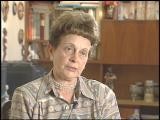
Testimonio
Examine una lista por orden alfabético de historias narradas por los sobrevivientes. Estas entrevistas consisten en descripciones de primera mano y experiencias personales vividas durante el Holocausto y la Segunda Guerra Mundial.
<< Atrás | Resultados de visualización 11-20 de 35 para "Testimonio" | Siguiente >>
-
Selma (Wijnberg) Engel
TestimonioSelma era la menor de cuatro hijos nacidos de padres judíos. Cuando Selma tenía siete años, se mudó con su familia a la ciudad de Zwolle, donde sus padres administraban un pequeño hotel. Los alemanes invadieron Holanda en 1940 y confiscaron el hotel. La familia tuvo que vivir en una sección judía pobre de la ciudad. Selma se escondió pero fue delatada y enviada al campo de Westerbork. En abril de 1943, fue deportada a Sobibor, donde trabajó en el área de clasificación de ropa. Allí, los…

-
Siegfried Halbreich
TestimonioDespués de que Alemania invadió Polonia el 1 de septiembre de 1939, Siegfried huyó con un amigo. Intentaron obtener documentos que les permitieran ir a Francia, pero fueron denunciados a los alemanes. Siegfried fue encarcelado, llevado a Berlín, y luego transportado al campo de Sachsenhausen cerca de Berlín en octubre de 1939. Él fue de los primeros polacos judíos encarcelados en Sachsenhausen. Los prisioneros eran maltratados y asignados a trabajos forzados. Después de dos años, Siegfried fue…
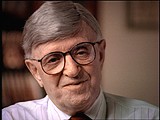
-
Siegfried Halbreich describe el trato a los prisioneros en el campo de Sachsenhausen
TestimonioDespués de que Alemania invadió Polonia el 1° de septiembre de 1939, Siegfried huyó con un amigo. Intentaron obtener documentos que les permitieran ir a Francia, pero fueron entregados a los alemanes. A Siegfried lo encarcelaron, lo llevaron a Berlín y lo trasladaron al campo de Sachsenhausen, cerca de Berlín, en octubre de 1939. Fue uno de los primeros judíos polacos encarcelados en Sachsenhausen. Ahí maltrataban a los reclusos y los obligaban a hacer trabajos forzados. Al cabo de dos años,…
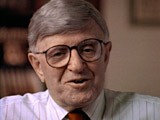
-
Sonia S.
Testimonio(English translation) and they brought us to Stutthof. It was a huge camp where it seems they brought lots of people from all the camps and there was a huge plaza. The first thing they did is that they disrobed us and we had to get a bath to disinfect us and to bathe us. And at that time there weren't any lice because they found a way to…when one went to bathe they put all the clothes in this oven. It had such a high temperature that it killed all the lice. So when they brought us there they took all the…
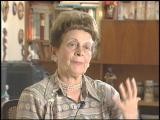
-
Sonia S.
Testimonio(English translation) Our state of mind was to try to survive, and even though one felt bad there was no other choice. We had to move forward. The fear always existed because you never knew what tomorrow would hold. My mother in order to send a package to my father had to find food in the kitchen where she worked. She would make a package, she would have to make a package for that man, meet him by the fence between the men's and women's barracks -- once they caught her and beat her -- and give the man a…
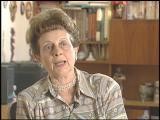
-
Sonia S.
Testimonio(English translation) And we also worked in another … in another kitchen where people worked and the food was made for the Germans and the prisoners. There were pots over a fire that were really high…with ladders and to clean them or serve from them we had to climb up on the ladder, that's how tall they were. So we made noodles with milk, sweet for the Germans. And after serving them to wash out a pot we had to get inside it, we took everything out and we had a few more portions to eat. We could also…
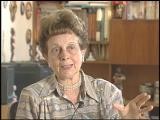
-
Sonia S.
Testimonio(English translation) I also forgot to tell you that a few days after arriving at the camp they cut all our hair off, the hair of all the women. We had no hair left. Well, because we worked with fabric, with the clothes, we found a few pieces of material. We made some coverings for our heads and were able to cover up a bit. They were all things to humiliate us and to make our lives more difficult, to exterminate us
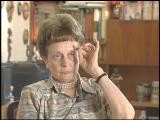
-
Sonia S.
Testimonio(English translation) We decided because we had been in Italy almost two years and because the state of Israel wasn't … the state of Israel hadn't been born yet so to speak and we couldn't go. The English … they would let fewer and fewer Jews immigrate and because my father had here … one gets tired, we'd already been there for two years. We lost so many years because of the war. One wants to start a new life, to start to work. Because without working it also isn't a very comfortable way to live.…
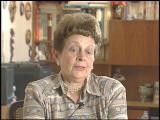
-
Sonia S.
Testimonio(English translation) One dreams of being in the concentration camps and that they are coming to take you and that they will put you in the train cars. On remembers… of the early times one remembers. When I came for the first time and they invited me… Well, the first time we stayed at my aunt's. But some friends invited me to their home and when I entered and I saw a house, a home, I started to cry. Because I felt something…I don't know. A house was for me … for one who lived always on the floor,…
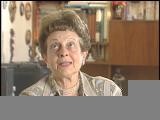
-
Sonia S.
Testimonio(English translation) …we also worked in the woods to cut down trees. At that time the saws were manual. Two people would get together and saw and cut down the tree. There were accidents because the tree instead of going here would fall over there, sometimes falling on someone. Well, honestly I was a good worker. No one complained. Everyone wanted to work with me because I would work. I didn't like…when I had to saw I would saw, when I had to dig I would dig. Because we had to finish that work and on…
